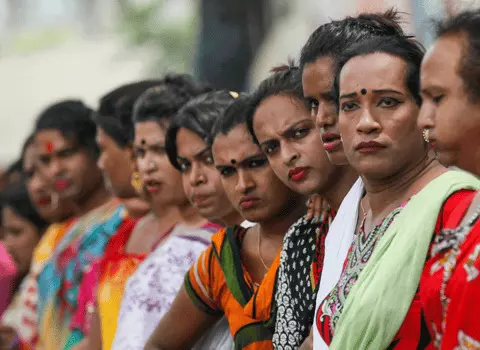Transwomen in India face stigma, rejection, mental health crisis: Study
Healthcare discrimination emerged as another significant barrier
By Newsmeter Network
Representational Image.
Hyderabad: Transwomen in India face stigma, rejection and systemic discrimination, leading to poor mental health outcomes and limited opportunities, according to a study by The George Institute for Global Health India and its global collaborators.
The research, published in Wellcome Open Research, highlighted the urgent need for inclusive policies and systemic changes to address these challenges.
Early stigma and social exclusion
The study revealed that stigma begins early in life, often within families where transwomen face rejection, leading to a loss of self-esteem. The rejection extends to schools, where bullying and harassment result in high dropout rates. Many transwomen are left without education or stable employment, forcing them into begging or sex work for survival.
“The lack of acceptance from families and society affects self-esteem, leaving scars that are hard to heal,” researchers stated, emphasising the long-term mental health impact of such experiences.
Discrimination in healthcare
Healthcare discrimination emerged as another significant barrier.
Many transwomen reported mistreatment by hospital staff and a lack of understanding from healthcare providers, discouraging them from seeking medical assistance.
“These experiences take a significant toll on mental well-being, contributing to high rates of depression, anxiety, and suicidal thoughts among transwomen,” the study noted.
Need for social support and policy change
The study stressed that social support, education and employment opportunities could foster resilience and improve mental well-being. However, such opportunities remain scarce in India, where an estimated 4.8 million transgender people live.
Dr Sandhya Kanaka Yatirajula, program of mental health at The George Institute for Global Health India, highlighted the importance of addressing stigma.
“One of the most pressing revelations from the study is the lack of mental health research focusing on transwomen, especially in low- and middle-income countries like India. This research highlighted the urgent need for interventions to address stigma and its impact on their lives.”
Media’s role in changing perceptions
The study also noted the evolving role of media in shaping perceptions of transgender individuals.
“The media can play a crucial role in influencing people’s perception of transgender people,” said Dr Ankita Mukherjee, senior research fellow at The George Institute. “In the past, media portrayals of transpersons reinforced and perpetuated stereotypes. However, in recent times, a shift in the media’s perception is discernible. This shift is welcome and may go a long way in reducing transphobia.”
Recommendations for change
The researchers called for:
- Increased investment in mental health research for transgender communities.
- Evidence-based policies promoting inclusion and equity.
- Safe spaces where transwomen feel valued and respected.
These steps, they argued, are essential for dismantling structural stigma and improving the lives of transwomen in India.
The work was authored by Dr Sandhya Kanaka Yatirajula, Dr Ankita Mukherjee, Dr Santosh Giri, and Prof. Pallab K. Maulik from The George Institute for Global Health India, in collaboration with Kolkata Rista, the University of New South Wales, Imperial College London, and the Manipal Academy of Higher Education.